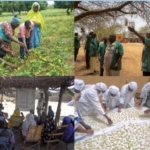


Université Joseph Ki-Zerbo
Water and Sanitation for Africa (WSA), the IGZ (german cooperation), ONEA and Ouagadougou City Council
Burkina Faso
12/2019—12/2020
To ensure sustainable soil fertility in West Africa, new approaches are needed that include systematic nutrient cycling. Circular economy of organic matter can link urban and rural areas in a bi-directional fashion: food comes into cities from rural areas, and can be returned as organic fertilizers. The bulk of organic matter and nutrients in human wastes are produced in cities, where they lead to pollution and disease. The return of wastes to the rural environment for use as fertilizers for crops and trees would be a potential solution toward sustainable soil health. Some progress has been made in this area; more than 11,000 “Ecosan” (ecological sanitation) toilets have been constructed in Burkina Faso. However, evaluations of their functionality have highlighted some difficulties related to their ecological functionality. There is need to further investigate how the Ecosan toilets could support larger nutrient cycling efforts in Burkina Faso. Innovation processes around the entire waste-to-value chain may enhance the territorial circular economy for organic matter.
To fight the problem of land and soil degeneration, there is urgent need to explore ways to build soil health in West Africa. Recycling urban organic waste in peri-urban smallholder agriculture has the potential to contribute to improved soil health in smallholders’ production systems. Such nutrient recycling would represent a major element of agroecological intensification and is therefore well aligned with CCRP’s overall goal and strategy. The suggested inception research is required to inform the CCRP’s future investment strategy in this thematic area of nutrient cycling using human waste.
Intended Outputs:
The inception research will guide the design of a larger project to enable recycling of urban organic waste. It will also inform the CCRP’s investment strategy into nutrient recycling from human waste.
Outcomes:
The project’s results will help to design an efficient project to add value to human waste, which, if funded, will enhance not only circular economy while providing livelihood options for rural and peri-urban young people. For example, poultry and fish breeding could increase by using sanitized worms produced with wastes.
